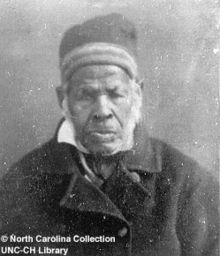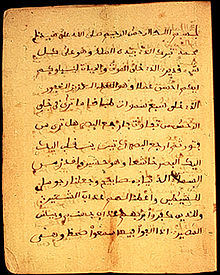- Omar Ibn Said
-
Omar Ibn Said 
Born 1770
Futa Tooro, SenegalDied 1864
Bladen County, North Carolina, USAOther names Uncle Moreau, Prince Omeroh Education Formal Islamic education in Senegal Occupation Scholar, Slave Known for Islamic Scholar, author of Slave narratives Religion Muslim Omar ibn Said (1770–1864) was born in present-day Senegal in Futa Tooro,[1] a region along the Middle Senegal River in West Africa, to a wealthy family.[2] He was an Islamic scholar and a Fula who spent 25 years of his life studying with prominent Muslim scholars in Africa. In 1807, he was captured during a military conflict, enslaved and taken across the Atlantic Ocean to the United States. He escaped from a cruel master in Charleston, South Carolina, and journeyed to Fayetteville, North Carolina. There he was recaptured and later sold to James Owen. Said lived into his mid-nineties and was still a slave at the time of his death in 1864. He was buried in Bladen County, North Carolina. Omar ibn Said was also known as Uncle Moreau and Prince Omeroh.[1]
Although Omar converted to Christianity on December 3, 1820, many modern scholars believe he continued to be a practicing Muslim, based on dedications to Muhammad written in his Bible, and a card dated 1857 on which he wrote Surat An-Nasr, a short sura which refers to the conversion of non-Muslims to Islam 'in multitudes.' The back of this card contains another person's handwriting in English misidentifying the sura as the Lord's Prayer and attesting to Omar's status as a good Christian.[3]. Additionally, while others writing on Omar's behalf identified him as a Christian, his own autobiography and other writings offer more of an ambiguous position. In the autobiography, he still offers praise to Muhammad when describing his life in his own country; his references to "Jesus the Messiah" in fact parallel Quranic descriptions of Jesus (who is called المسيح 'the Messiah' a total of 11 times in the Quran), and descriptions of Jesus as 'our lord/master' (سيدنا) employ the typical Islamic honorific for prophets and is not to be confused with Lord (ربّ); and description of Jesus as 'bringing grace and truth' (a reference to John 1:14) is equally appropriate to the conception of Jesus in Islam. Given Omar's circumstances of enslavement "among the Christians" and the possibilities of lobbying for his freedom that only came with confessing Christianity, his conversion can be argued to have been made under duress. In 1991, a masjid in Fayetteville, North Carolina renamed itself Masjid Omar Ibn Said in his honor.[4]
Manuscripts
Omar ibn Said is widely known for fourteen manuscripts that he wrote in Arabic. Out of all of his Arabic manuscripts, he is best known for his autobiographical essay written in 1831.[5] It describes some of the events of his life and includes reflections on his steadfast adherence to Islam and his openness towards other 'God fearing' people. On the surface the document may appear to be tolerant towards slavery, however Said begins it with Surat Al-Mulk, a chapter from the Qur'an, which states that only God has sovereignty over human beings.
Most of Said's other work consisted of Islamic manuscripts in Arabic, including a handwritten copy of some short chapters (surat) from the Qur'an that are now part of the North Carolina Collection in the Wilson Library at University of North Carolina at Chapel Hill. Transcribing from memory, ibn Said made some mistakes in his work, notably at the start of Surat An-Nasr. Said was also the author of a letter dated 1819 and addressed to James Owen's brother, Major John Owen, written in Arabic and containing numerous Quranic references (including from the above-mentioned Surat Al-Mulk), which also includes several several geometric symbols and shapes which point to its possible esoteric intentions.[6] This letter, currently housed in Andover Theological Seminary, is reprinted in Allen Austin's African Muslims in Antebellum America: A Sourcebook.
Further coverage of Omar's writings within the context of Slave Narratives and Muslim Slave Narratives can be found in Five Classic Muslim Slave Narratives by Muhammed Al-Ahari. The presentation of Africa, Islam and slavery in the American slave Narratives of Muslim slaves in the Americas is a topic that is often overlooked in discussing the genre of slave narratives and the birth of African American Literature. In fact the first biography was that of a former Maryland slave, Job Ben Solomon, published in 1730 in Britain. By reexamining these often overlooked narratives we can get insight into African Islam, the turmoil of integration into a foreign culture, life in Africa, and life as a slave in the Americas. The primary sources include: the narrative of Job ben Solomon, the two autobiographical pieces of Muhammad Said of Bornu, the Arabic autobiography of 'Umar ibn Said, the Jamaican narrative of Abu Bakr Said, a discussion of coverage on Bilali Muhammad's excerpts from the Risalah of Abi Zaid, Theodore Dwight's articles on the teaching methods of the Serachule teacher slave Lamen Kebe, and a letter describing Salih Bilali.
Further reading
- A Muslim American Slave: The Life of Omar Ibn Said ed. and translated by Ala Alryyes (University of Wisconsin Press; 2011) 216 pages;
- Allan D. Austin, African Muslims in Antebellum America: A Sourcebook, New York: Garland Publishers, 1984.
- Thomas C. Parramore, "Muslim Slave Aristocrats in North Carolina," North Carolina Historical Review, April 2000, Vol. 77 Issue 2, pp 127–150
References
- ^ a b Omar ibn Said (1831). "Autobiography of Omar ibn Said, Slave in North Carolina, 1831". University of North Carolina at Chapel Hill. http://docsouth.unc.edu/nc/omarsaid/omarsaid.html.
- ^ Powell, William S. (1979). "Omar ibn Said, b. 1770?". Dictionary of North Carolina Biography. University of North Carolina Press. http://docsouth.unc.edu/nc/omarsaid/bio.html.
- ^ Horn, Patrick E.. "Omar ibn Said, African Muslim Enslaved in the Carolinas". University Library, University of North Carolina. http://docsouth.unc.edu/highlights/omarsaid.html.
- ^ Omar ibn Said Davidson Encyclopedia Tammy Ivins, June 2007
- ^ Jonathan Curiel. Al'America. pp.30-32.
- ^ Hunwick, John O. (2003-4). "I Wish to be Seen in Our Land Called Afrika: Umar b. Sayyid's Appeal to be Released from Slavery (1819)". Journal of Arabic and Islamic Studies 5. http://www.lancs.ac.uk/jais/volume/docs/vol5/5_hunwick.pdf.
Categories:- American Muslims
- African-American people
- American people of Senegalese descent
- American slaves
- Muslim scholars
- 1770 births
- 1864 deaths
Wikimedia Foundation. 2010.

